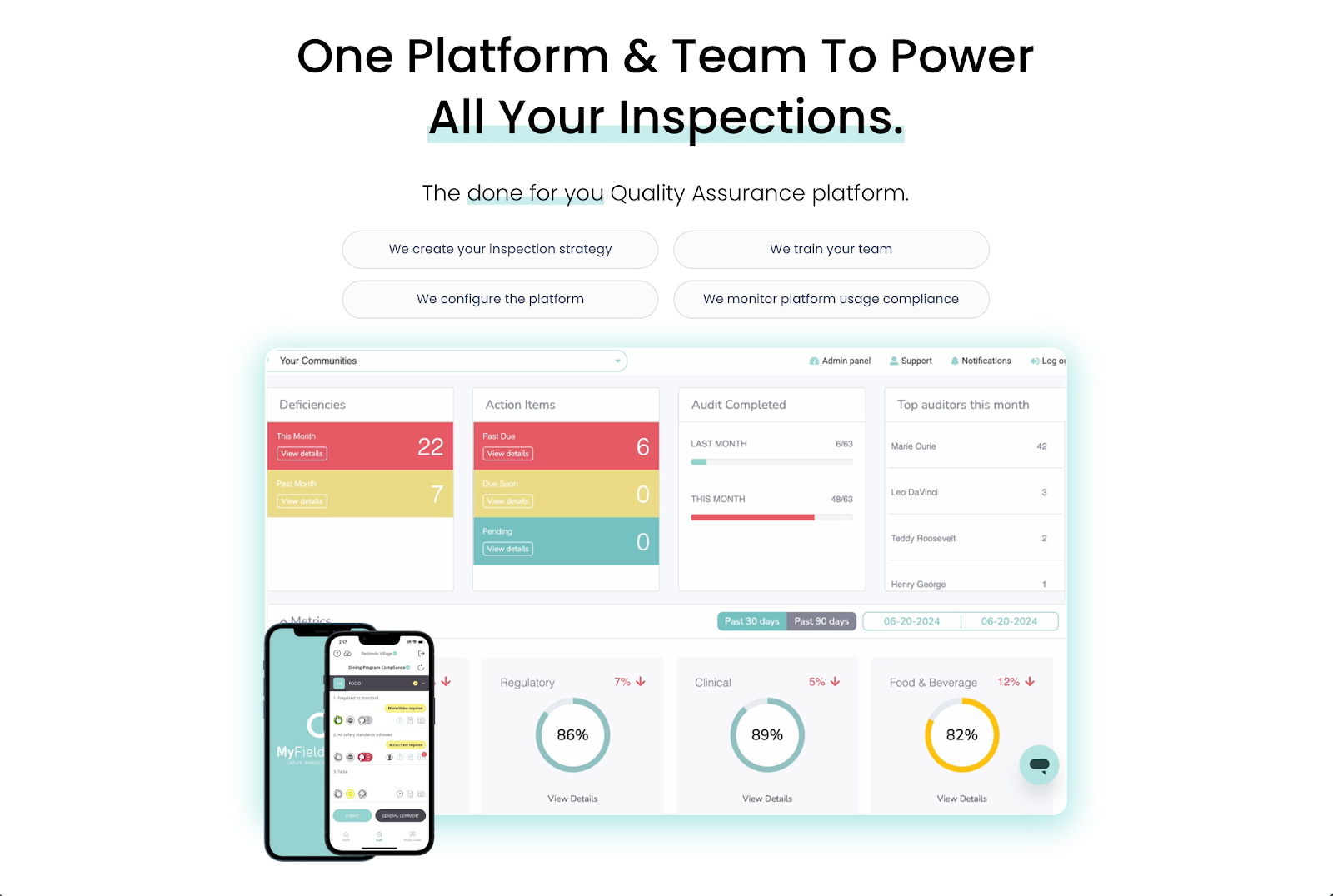.svg)
7 Best Software for Food and Beverage Industry Operators

Take Control of QA.
Make Inspections Effortless.

We’ll quickly uncover your needs and share how we can help—no pressure, no stress, just solutions. Grab your spot on our calendar today!
Be survey-ready every day with three simple dining audits

We’ll quickly uncover your needs and share how we can help—no pressure, no stress, just solutions. Grab your spot on our calendar today!
Running food and beverage operations means juggling dozens of responsibilities across multiple locations. From managing inspections to meeting food safety standards, there's no room for guesswork.
Operators like you need software that gives you real-time visibility into what's happening on different sites. These digital tools help you keep teams aligned, maintain high standards, and prove value to clients.
This article reviews the best software solutions for food and beverage businesses. You'll also learn about the different types of tools and the benefits of using them.
Different Types of Food and Beverage Software
Food and beverage operators rely on many software tools to maintain visibility and resolve issues on the ground. Let's look closely at each one below:
Audit and Inspection Tools
Audit and inspection software tools help you catch problems before your clients do. They support your field teams with mobile checklists and real-time performance tracking.
You gain instant visibility into what’s happening on the ground without chasing down people. With these tools, you can also generate detailed reports on the spot, which you can easily share with clients.
You can show proof of performance and compliance with regulatory standards. This increased transparency builds trust and enhances retention.
Compliance Management Platforms
Compliance issues can lead to costly penalties, license revocations, and even business shutdowns. This can affect your reputation in the food and beverage industry, allowing other companies to gain a competitive advantage.
A good compliance platform helps you avoid these consequences by tracking compliance in real time. It can closely monitor production processes, cleaning logs, food safety reports, waste management practices, training records, supplier compliance, and more.
Compliance management tools also provide alerts when checks are missed and compliance documentation is incomplete. This means you instantly get notified of risks, so you can quickly address them.
You can ensure food safety compliance while maintaining strong relationships with auditors and enterprise clients.
Enterprise Resource Planning (ERP) Software
ERP systems bring your food and beverage operations under one roof. They combine core processes, like inventory control, finance, food production, supplier management, and distribution, in a single platform.
Some ERPs even support recipe management, batch production, and allergen management. They help food and beverage manufacturers improve supply chain visibility and manage business processes effectively.
Scheduling and Labor Management Software
Scheduling inspections and employee shifts can be difficult for many operators. Fortunately, you can use scheduling software to prepare for upcoming audits, fill shifts, avoid overtime, and ensure compliance with labor laws.
Most of these platforms include drag-and-drop tools, mobile access for employees, and alerts for schedule conflicts or missed breaks.
Thanks to these features, you can avoid miscommunications and ensure everyone is on the same page. You no longer need to use spreadsheets to chase employees down or keep clients waiting for reports. With centralized data, you can bridge gaps and align different sites in real time.
Enterprise Asset Management (EAM) Software
Your food and beverage business relies on different assets to run efficiently. Think of kitchen equipment, refrigeration units, packaging equipment, and even water treatment systems.
With the right EAM software, you can track asset health, plan maintenance, and reduce unexpected failures to maintain operational efficiency.
You can also set service reminders, assign tasks, and log equipment history. This helps you reduce costs and fix issues before they affect your supply chain efficiency.
Point of Sale (POS) Systems
POS systems go beyond taking orders. They also help you manage payments, track sales, and give you insights into customer habits.
Most POS systems seamlessly integrate with inventory tools to update stock levels automatically. These help you avoid understocking and overstocking ingredients.
Some platforms even allow mobile payments and self-service kiosks to speed up food service and reduce wait times.
Customer Experience and Feedback Tools
These tools help you understand how food and beverage customers feel about your service, meals, and overall experience.
You can collect feedback through post-meal surveys, QR codes, satisfaction ratings, and comment forms. You can then respond to complaints or customer preferences quickly.
Plus, you get notified about recurring issues. This insight is useful for improving service and reducing repeat mistakes.
7 Best Software Solutions for Food and Beverage Companies
Below are seven proven software tools that food and beverage operators use:
1. MyFieldAudits

MyFieldAudits is specifically built for food service management companies that need more than a standard inspection software tool. It offers a mobile-first platform that simplifies on-site audits while providing real-time visibility to leadership teams and clients.
With MyFieldAudits, you can capture photos, log data instantly, and assign follow-up actions from a digital dashboard. This eliminates the need for paperwork or outdated spreadsheets.
You can also generate reports instantly, allowing you to share proof of performance and compliance with clients when needed. You can keep everyone in sync, which helps build trust and retention.
What sets MyFieldAudits apart is its hands-on support. Their team works with you to build custom inspection forms based on KPIs that matter.
Industry experts also configure the platform to your specific needs, provide thorough training, and monitor usage compliance. You can focus on capturing critical data that drives operational excellence.
Key Features:
- Advanced platform: MyFieldAudits's mobile inspection platform lets you conduct audits, generate reports, and assign action items to on-site teams. It can also capture photos, videos, and business data to give you real-time visibility into operations.
- Customized solutions: Industry experts will work closely with you to develop inspection forms tailored to specific operational needs.
- Dedicated support: MyFieldAudits's team handles everything, from training to ongoing monitoring, to improve performance and client trust.
- Enterprise-level focus: Designed for large organizations, not individuals or those seeking off-the-shelf solutions.
Why Choose MyFieldAudits?
- Proof of performance made simple: Shareable, real-time reports let you show exactly what happened on-site. You no longer need to chase down people or rely on outdated spreadsheets.
- Clear visibility across all locations: Operators and clients see the same data, closing communication gaps and keeping multi-site teams aligned.
- Built for field use: MyFieldAudits's mobile inspection platform is designed for field teams and not just office dashboards. Inspections get done on the ground by real people to solve operational challenges.
- Centralized data: All inspection results, task updates, and performance scores are accessible in a centralized platform. This keeps everyone on the same page in real time.
- Entire lifecycle management: MyFieldAudits handles the entire lifecycle of on-site inspections, from mobile field execution to actionable insights.
Schedule a discovery call today to learn how MyFieldAudits can benefit your food service management company.
2. Trustwell

Trustwell (formerly FoodLogiQ) helps you stay ahead of operational risks. It focuses on traceability, safety, and supply chain transparency. Its platform is built to support compliance programs, especially in large supply networks.
With Trustwell, you can monitor food safety checks, vendor approvals, and location-based data from one place.
You can also improve food quality control by tracking issues back to the source. This increased visibility helps you gain confidence in your supply chain.
Key Features:
- Regulatory consulting: Trustwell's team of regulatory consultants helps you meet compliance with the FSMA, FDA, and other legal standards.
- Recall management: Real-time dashboards and alerts can track affected products and notify supply chain partners for immediate pullout. This can protect customers from foodborne illnesses and strengthen supplier relationships.
- Quality incident tracking: Trustwell can monitor food safety issues, complaints, and non-conformances across multiple locations to ensure consistent product quality.
- Food traceability: The platform supports end-to-end tracking of ingredients, suppliers, and finished products. It gives you complete visibility, from source to shelf, for faster risk response and supply chain optimization.
3. Sage X3

Sage X3 is a powerful ERP system that takes control of your entire F&B business, from supply chain management to sales.
It helps you streamline operations and improve data management across departments. It tracks ingredients, batch numbers, allergens, and expiration dates with accuracy. It even supports food safety compliance and quality checks.
Plus, Sage X3 can automate workflows and standardize operating procedures. This allows you to save time and reduce manual tasks while maintaining top-notch food quality.
Key Features:
- Supply chain management: It helps food manufacturers oversee procurement, production planning, inventory, and distribution.
- Data management and analytics: Sage X3 uses customizable dashboards and reports to centralize data and improve decision-making.
- Automated processes: The platform automatically handles inventory control, order processing, and quality checks to reduce manual data entry and complete tasks faster.
- Financial reporting: Sage X3 includes integrated tools for budgeting, cost analysis, and compliance reporting. These provide financial summaries across departments and sites.
4. 7shifts

7shifts is built for food service teams that need better control over scheduling. It helps your managers create and share shift schedules in minutes.
Meanwhile, staff members can view their shifts, swap with others, and request time off through the mobile app. They also get notified about scheduling conflicts or overtime risks.
With 7shifts, restaurants and other food businesses can stay organized across different locations and save valuable time.
Key Features:
- Employee scheduling: Drag-and-drop tools enable managers to create schedules within minutes, while workers receive instant notifications about work shifts.
- Task management: 7shifts can set task timeframes, proof of completion, and duplicate tasks to reduce manual work.
- Mobile app: Employees can access schedules, shift swaps, and messages from any device. This leads to faster responses and fewer missed shifts.
- Integrated payroll: The platform automatically calculates wages and tips to simplify payroll processing.
5. Aptean

Aptean offers an AI-powered EAM system to help food and beverage manufacturers maximize asset performance.
It tracks maintenance schedules, repair history, and asset performance in real time. It also helps you manage spare parts, assign work orders, and monitor technician activity from a centralized system.
This can extend equipment life, reduce unplanned downtime, and lower the total cost of ownership.
Key Features:
- Preventive maintenance scheduling: The platform can implement preventive maintenance strategies to reduce downtime and extend asset life.
- Advanced reporting and analytics: These provide detailed insights into an asset's performance and maintenance history.
- Work order and inventory management: Aptean gives your technicians access to the right information and tools to complete jobs quickly.
- Mobile accessibility: The platform can be accessed from mobile devices, regardless of whether you're on the site or working from home.
6. Toast POS

Toast POS helps you serve guests faster and manage restaurant orders with less effort. It supports tableside ordering, kitchen display systems, and self-service kiosks.
Toast also offers integrated online ordering and delivery tools. Payments are fast and secure, with options for contactless checkout.
Plus, the system runs on durable hardware built for the heat of the kitchen. It gives you greater control over the front and back of the house.
Key Features:
- Tableside and kiosk ordering: Toast POS provides handheld devices and self-service kiosks for faster order input.
- Kitchen display system: Digital screens help you manage incoming orders in real time and improve communication between front-of-house and kitchen staff.
- Restaurant-grade hardware: Toast POS includes durable terminals, handhelds, and printers built for high-heat, high-traffic environments.
- Online ordering service: Specialized software supports direct-to-kitchen digital order management through Google Search or integrated delivery apps.
7. Alchemer

Alchemer helps food and beverage companies collect and act on feedback that matters. Its platform makes it easy to gather real-time data from customers, employees, and partners.
You can run post-meal surveys, product reviews, and experience polls across multiple channels. This enables you to identify service gaps early and adjust quickly.
With Alchemer's strong reporting tools, you can also track customer satisfaction over time. You can then use their insights to transform business operations.
Key Features:
- Multi-channel feedback collection: It lets you deliver surveys, polls, and rating prompts through your website and in-app channels.
- Integrated AI: Alchemer's Pulse technology uses AI for real-time sentiment analysis and text categorization.
- Digital experience management: The platform can improve user experience through user-friendly websites and apps, loyalty programs, and modernized services.
- Automation tools: Alchemer can automatically send personalized surveys based on any event in your business and implement corrective actions based on your customer’s journey.
Simplify Food and Beverage Inspections With MyFieldAudits
Managing inspections can be a headache for many food and beverage companies. But with MyFieldAudits, you can say goodbye to operational chaos and ensure regulatory compliance across all locations.
MyFieldAudits handles the entire lifecycle of on-site inspections, from scheduling and execution to reporting and performance tracking. Through its mobile app, you can use customized inspection forms and real-time reports to maintain visibility of every site.
MyFieldAudits also stands out for its hands-on, enterprise-level support. Industry experts work closely with you to build tailored QA programs that drive compliance, transparency, and operational excellence.
Book a personalized demo today! You can also visit this product overview to learn more about MyFieldAudits.
FAQs About the Best Software for Food and Beverage Industry
What is F&B software?
F&B software refers to digital tools designed to help food and beverage businesses manage daily tasks. These include inspections, inventory and warehouse management, scheduling, and regulatory compliance tracking.
What is SAP in the food industry?
SAP is an enterprise resource planning system used by large food companies. It helps manage raw materials, inventory, production, and finances. It also supports food safety checks, traceability, and supply chain tracking.
What is the ERP system in the food industry?
ERP systems in the food industry combine different processes into one platform, such as inventory, purchasing, production, finance, and more. They help you manage expiration dates, monitor food quality, and maintain traceability across your supply chain.
%201.svg)






%201%20(1).svg)